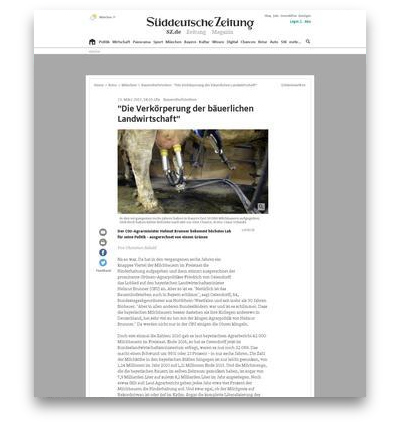
\"The embodiment of rural agriculture\"
Well, well. Almost a quarter of dairy farmers in Bavaria have given up cattle farming in the past six years and then the prominent Green Party agricultural politician Friedrich von Ostendorff, of all people, sings the praises of Bavarian Agriculture Minister Helmut Brunner (CSU). But that's how it is. \"Of course, the death of farms is also bad in Bavaria\", says Ostendorff, 64, a member of the Bundestag from North Rhine-Westphalia and an organic farmer for more than 30 years. \"But it was and is worse in all other federal states. The fact that Bavarian dairy farmers are better off than their colleagues elsewhere in Germany has a lot to do with Helmut Brunner's smart agricultural policy." Some people's ears will be ringing, and not just in the CSU. source: www.sueddeutsche.de
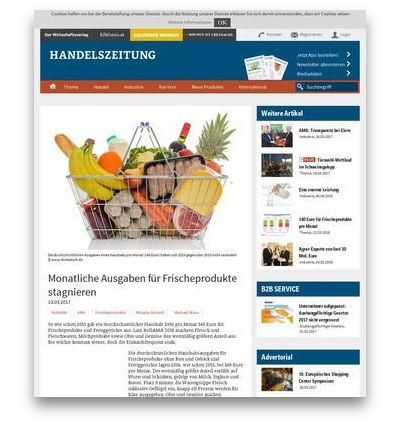
Monthly spending on fresh produce stagnates
As in 2015, the average household spent €140 per month on fresh produce and ready meals in 2016. According to RollAMA 2016, meat and meat products, dairy products and fruit and vegetables accounted for the largest share in terms of value. The average household spend on fresh produce excluding bread and pastries and ready meals was €140 per month in 2016, as it was in 2015. Sausage and ham accounted for the largest share in terms of value, followed by milk, yoghurt and butter. Meat, including poultry, takes third place, with just under eleven per cent spent on cheese. Fruit and vegetables together account for around a quarter of expenditure. source: www.handelszeitung.at
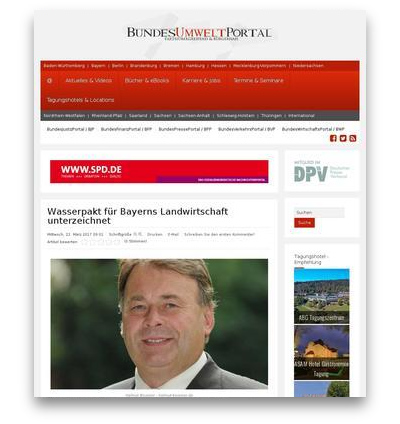
Water pact for Bavaria's agriculture signed
(BUP) Agriculture Minister Helmut Brunner wants to promote soil and water protection in Bavaria with a broad alliance of producers, water suppliers, associations and institutions. On his initiative, 14 different associations and organisations have now concluded and signed a "Water Pact" - including the Bavarian Ministry of the Environment. "We can achieve the most for water protection if all stakeholders make their contribution and work together intensively," said the Minister at a press event in Munich. The Water Pact is a valuable basis for joint efforts and success. Environment Minister Ulrike Scharf emphasised: "Water protection is a task for society as a whole. By 2021, a total of around 1.2 billion euros will be invested in the protection of water bodies in Bavaria. The most important upcoming tasks include protecting groundwater even better, reducing the input of nutrients into water bodies, giving rivers more space again and improving passability for aquatic life. The Water Pact with its diverse stakeholders can provide important impetus in this regard.\" Source: www.bundesumweltportal.de
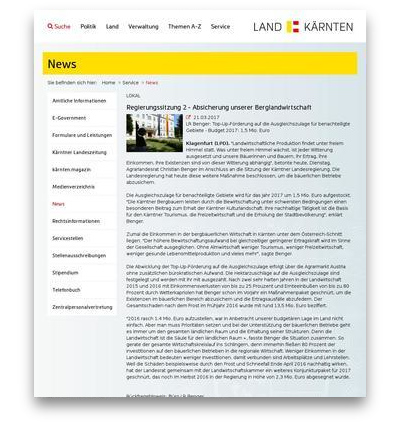
Government meeting 2 - Safeguarding our mountain agriculture
LR Benger: Top-up funding for the equalisation supplement for disadvantaged areas - 2017 budget: EUR 1.5 million Klagenfurt (LPD). \"Agricultural production takes place in the open air. What grows in the open air is exposed to all weather conditions and our farmers, their yields, their income and their livelihoods depend on this weather\", emphasised Christian Benger, Member of the Carinthian Provincial Council for Agriculture, following the meeting of the Carinthian provincial government today, Tuesday. The state government decided on this further measure today in order to safeguard farms. Source: www.ktn.gv.at
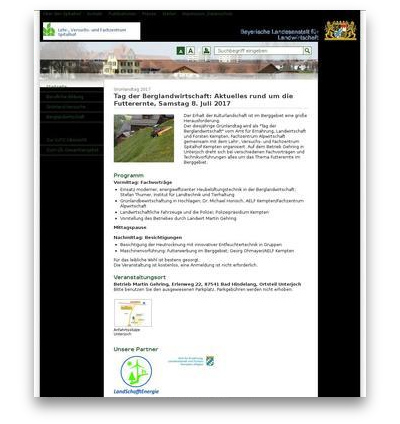
Mountain Farming Day: News about the forage harvest, Saturday 8 July 2017
Preserving the cultural landscape is a major challenge in mountain regions. This year's Grassland Day is being organised as the "Mountain Farming Day" by the Office for Food, Agriculture and Forestry in Kempten, Alpine Farming Centre, together with the Spitalhof Teaching, Research and Technical Centre in Kempten. At the Gehring farm in Unterjoch, everything revolves around the topic of forage harvesting in mountain areas with various specialist presentations and technical demonstrations. source: www.lfl.bayern.de
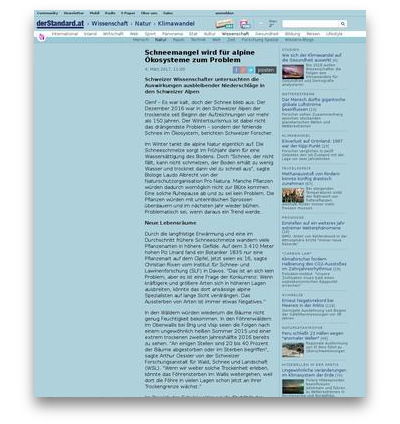
Lack of snow is becoming a problem for alpine ecosystems
Swiss scientists investigated the effects of the lack of precipitation in the Swiss AlpsGeneva - It was cold, but there was no snow: December 2016 was the driest December in the Swiss Alps since records began more than 150 years ago. Winter tourism is not the most pressing problem - but the lack of snow in the ecosystem, report Swiss researchers Source: derstandard.at
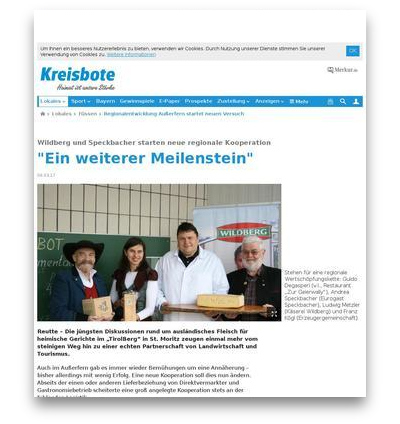
Wildberg and Speckbacher launch new regional cooperation \"Another milestone\"
Reutte - The recent discussions about foreign meat for local dishes in the "TirolBerg" in St. Moritz are yet another example of the rocky road to a genuine partnership between agriculture and tourism. In the Außerfern region, too, there have been repeated efforts to bring about a rapprochement - but with little success so far. A new co-operation is now set to change this. Apart from one or two supply relationships between direct marketers and catering businesses, large-scale cooperation has always failed due to a lack of logistics. source: www.kreisbote.de
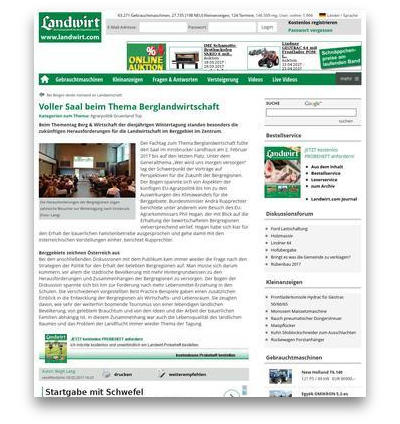
Full hall for the topic of mountain farming
The Mountain & Economy theme day at this year's winter conference focused in particular on the future challenges facing agriculture in mountain regions. The symposium on mountain agriculture filled the hall in Innsbruck's Landhaus on 2 February 2017 to capacity. Under the general theme of "Who will provide for us tomorrow", the presentations focussed on perspectives for the future of mountain regions. The topics ranged from aspects of future EU agricultural policy to the effects of climate change on mountain regions. Federal Minister Andrä Rupprechter reported, among other things, on the visit by EU Agriculture Commissioner Phil Hogan, which was very promising with regard to the preservation of farmed mountain regions. Hogan had clearly spoken out in favour of the preservation of family farms and thus went along with Austrian ideas, reported Rupprechter. Source: Landwirt.com
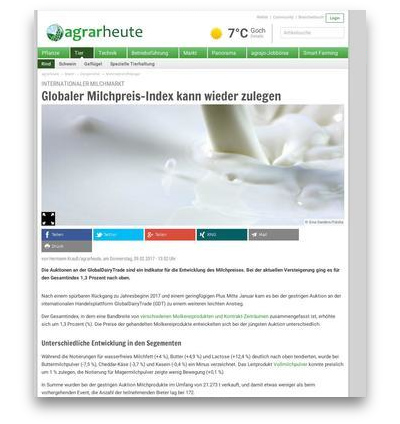
Global Milk Price Index can rise again
The auctions on GlobalDairyTrade are an indicator for the development of the milk price. At the current auction, the overall index rose by 1.3 per cent. After a noticeable decline at the beginning of 2017 and a slight increase in mid-January, yesterday's auction on the international trading platform GlobalDairyTrade (GDT) saw another slight increase. The overall index, which summarises a range of different dairy products and contract periods, rose by 1.3 per cent (%). The prices of the dairy products traded at the latest auction developed differently. Source: Agrarheute.com
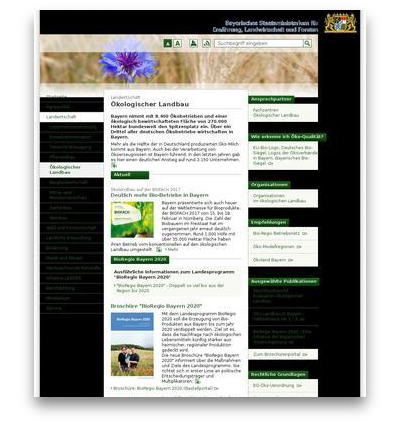
Organic farming
With 8,400 organic farms and an organically farmed area of 270,000 hectares, Bavaria is the leader in Germany. Over a third of all German organic farms are located in Bavaria and more than half of the organic milk produced in Germany comes from Bavaria. Bavaria is also a leader in the processing of organic products. In recent years, there has been a significant increase here to around 3,150 companies. source: stmelf.bayern.de
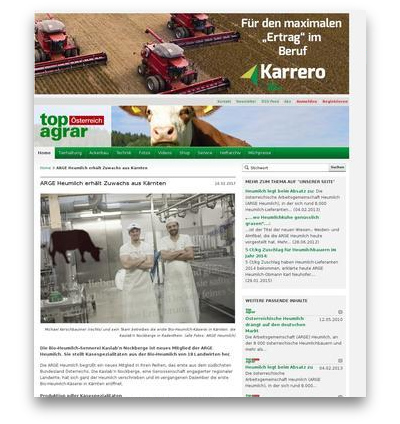
ARGE Heumilch gains new members from Carinthia
The organic hay milk dairy Kaslab'n Nockberge is a new member of ARGE Heumilch. It produces cheese specialities from organic hay milk from 18 farmers. ARGE Heumilch welcomes a new member to its ranks, the first from Austria's southernmost province. Kaslab'n Nockberge, a cooperative of committed regional farmers, has dedicated itself entirely to hay milk and opened the first organic hay milk cheese dairy in Carinthia last December. 18 organic hay milk farmers supply their cow's and goat's milk to Kaslab'n Nockberge. The product range extends from butter cheese to Tilsiter, young mountain cheese, raw cream butter and soon also matured mountain cheese, beer cheese, Emmental and goat's cheese. The whey produced during cheese production is not disposed of, but returned to the farms to be fed to pigs and young animals. source: topograf.at
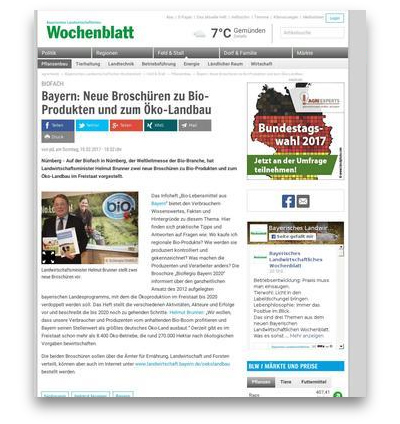
Bavaria: New brochures on organic products and organic farming
Nuremberg - At Biofach in Nuremberg, the world's leading trade fair for the organic sector, Minister of Agriculture Helmut Brunner presented two new brochures on organic products and organic farming in Bavaria. The information booklet "Organic Food from Bavaria" provides consumers with interesting facts and background information on this topic. It contains practical tips and answers to questions such as Where do I buy regional organic products? How are they produced, inspected and labelled? What do producers and processors do differently? The "BioRegio Bayern 2020" brochure provides information on the holistic approach of the Bavarian state programme launched in 2012, which aims to double organic production in Bavaria by 2020. The booklet presents the various activities, players and successes and describes the steps still to be taken by 2020. Helmut Brunner: "We want our consumers and producers to benefit from the ongoing organic boom and Bavaria to expand its position as Germany's largest organic state." There are currently more than 8,400 organic farms in Bavaria, which farm around 270,000 hectares according to organic standards. source: Agrarheute.com


